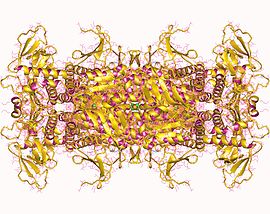Phosphoribosylaminoimidazole carboxylase
| phosphoribosylaminoimidazole carboxylase | |||||||||
|---|---|---|---|---|---|---|---|---|---|
 Phosphoribosylaminoimidazole carboxylase oktamer, Human | |||||||||
| Identifiers | |||||||||
| EC no. | 4.1.1.21 | ||||||||
| CAS no. | 9032-04-6 | ||||||||
| Databases | |||||||||
| IntEnz | IntEnz view | ||||||||
| BRENDA | BRENDA entry | ||||||||
| ExPASy | NiceZyme view | ||||||||
| KEGG | KEGG entry | ||||||||
| MetaCyc | metabolic pathway | ||||||||
| PRIAM | profile | ||||||||
| PDB structures | RCSB PDB PDBe PDBsum | ||||||||
| Gene Ontology | AmiGO / QuickGO | ||||||||
| |||||||||
| phosphoribosylaminoimidazole carboxylase, phosphoribosylaminoimidazole succinocarboxamide synthetase | |||||||
|---|---|---|---|---|---|---|---|
| Identifiers | |||||||
| Symbol | PAICS | ||||||
| Alt. symbols | PAIS | ||||||
| NCBI gene | 10606 | ||||||
| HGNC | 8587 | ||||||
| OMIM | 172439 | ||||||
| RefSeq | NM_006452 | ||||||
| UniProt | P22234 | ||||||
| Other data | |||||||
| EC number | 4.1.1.21 | ||||||
| Locus | Chr. 4 pter-q21 | ||||||
| |||||||
Phosphoribosylaminoimidazole carboxylase (or AIR carboxylase) is an enzyme involved in nucleotide biosynthesis and in particular in purine biosynthesis. It catalyzes the conversion of 5'-phosphoribosyl-5-aminoimidazole ("AIR") into 5'-phosphoribosyl-4-carboxy-5-aminoimidazole ("CAIR") as described in the reaction:
- 5-aminoimidazole ribonucleotide + CO2 5'-phosphoribosyl-4-carboxy-5-aminoimidazole + 2 H+
In plants and fungi
Phosphoribosylaminoimidazole carboxylase is a fusion protein in plants and fungi, but consists of two non-interacting proteins in bacteria, PurK and PurE.
The crystal structure of PurE indicates a unique quaternary structure that confirms the octameric nature of the enzyme.[1]
In Escherichia coli
In the bacterium Escherichia coli the reaction is catalyzed in two steps carried out by two separate enzymes, PurK and PurE.
PurK, N5-carboxyaminoimidazole ribonucleotide synthetase, catalyzes the conversion of 5-aminoimidazole ribonucleotide ("AIR"), ATP, and bicarbonate to N5-carboxyaminoimidazole ribonucleotide ("N5-CAIR"), ADP, and Pi.
PurE, N5-carboxyaminoimidazole ribonucleotide mutase, converts N5-CAIR to CAIR, the sixth step of de novo purine biosynthesis. In the presence of high concentrations of bicarbonate, PurE is reported able to convert AIR to CAIR directly and without ATP. Some members of this family contain two copies of this domain.[2]
References
- ^ Ealick SE, Stubbe J, Kappock TJ, Mathews II (1999). "Crystal structure of Escherichia coli PurE, an unusual mutase in the purine biosynthetic pathway". Structure. 7 (11): 1395–1406. doi:10.1016/S0969-2126(00)80029-5. PMID 10574791.
- ^ Meyer E, Stubbe J, Kappock TJ, Osuji C (1999). "Evidence for the direct transfer of the carboxylate of N5-carboxyaminoimidazole ribonucleotide (N5-CAIR) to generate 4-carboxy-5-aminoimidazole ribonucleotide catalyzed by Escherichia coli PurE, an N5-CAIR mutase". Biochemistry. 38 (10): 3012–3018. doi:10.1021/bi9827159. PMID 10074353.
External links
- phosphoribosylaminoimidazole+carboxylase at the U.S. National Library of Medicine Medical Subject Headings (MeSH)
- PAICS photo

